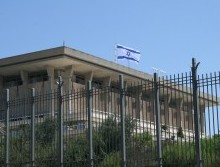 The decision to form a massive unity government in Israel instead of going to early elections is being presented as a means for working on major issues in the country, including national security concerns. Prime Minister Benjamin Netanyahu and the leader of the opposition Kadima party, Shaul Mofaz, reached the deal that will see the two largest political parties in parliament work together, thereby reseting the elections to November 2013.
The decision to form a massive unity government in Israel instead of going to early elections is being presented as a means for working on major issues in the country, including national security concerns. Prime Minister Benjamin Netanyahu and the leader of the opposition Kadima party, Shaul Mofaz, reached the deal that will see the two largest political parties in parliament work together, thereby reseting the elections to November 2013.
Prime Minister’s Office spokesman Mark Regev, speaking by phone with The Mideast Update, said they believe the arrangement will better enable the government to face key challenges, including the Middle East peace process.
The unity deal came after the Israeli cabinet started the process of calling for early elections for this September over concerns the coalition was unstable. Yet instead of a vote in four months, the Kadima party that has been one of the loudest critics of the government will join it.
Mofaz has been outspoken in the past with suggested concessions for the peace process with the Palestinians, and Regev said he will “now be at the table and will be making his opinions heard inside the government at the highest level.”
Mofaz’s input could have a quick impact. The Israelis have promised a letter for Palestinian President Mahmoud Abbas on the peace process. Without guaranteeing if Mofaz would now have a say in the letter, Regev said he is “sure” Mofaz will be “contributing to policy on all issues.” Regev also emphasized that Netanyahu is ready for renewed peace talks with the Palestinians.
“The Prime Minister reiterated his commitment and his desire to move ahead in the framework that was articulated by the Quartet: Israel is ready for direct negotiations with the Palestinians without any preconditions. We’re ready to start those negotiations immediately,” said Regev. “We hope the Palestinians will agree that they will return to talks and we can move ahead.”
The unity government will clearly give more political weight to decisions made over the next 18 months, as the coalition now controls 94 of the 120 seats in the Knesset (Israeli parliament). Considering Kadima and Netanyahu’s Likud party control almost half the parliament by themselves, ending the government’s term early through a dissolving of the coalition is virtually impossible.
Another critical matter facing Israel is the Iranian nuclear program. Media reports have suggested Israel could strike Iran’s nuclear facilities in an effort to prevent Tehran from getting nuclear weapons. At the least, Israel is seeking international pressure on Iran to convince them to abandon the nuclear ambitions. Regev noted there is “very little difference” for the political left and the right in Israel on the issue of Iran obtaining nukes.
The unity government now will jointly confront the national security matters and efforts to restart the peace process. “To do those things it’s also very important to have a national consensus, having a stable, a strong government. By bringing Kadima in, we believe we further those goals,” said Regev.
The government is also seeking new legislation on equal military and national service requirements for citizens, a policy that is ripe for controversy over compelling people into service. Regev noted that the issue facing the government could lead to a “historical” solution, and so having a “national consensus” coalition is a better way to address it.
Another major matter that needs attention is the system of elections and government in Israel. Regev said the diverse political landscape and current proportional representation system gives small parties with specific interests the power to bring coalition governments down. A narrow coalition depending on a small party to stay together must therefore give oversized concessions to that party.
It also makes the governments and premierships unstable. The past five Israeli governments prior the current one ended their terms early, with only one prime minister being re-elected. In light of that, Regev said they envy the stability of a system such as the one used in the United States, where a president serves four years before facing election. He said they’d like to see more of that stability in their own system.
In addition to the above issues, Regev said another matter facing the new government is responsibility in handling the economy.
The Israeli media have reported that not everyone in the country’s political system is pleased with the unity deal, including at least one member of Netanyahu’s own party. Still, Regev said Netanyahu believes that overall Israelis share a lot of common ground.
“I think ultimately the Prime Minister believes very strongly that there is a strong consensus on which the overwhelming majority of the Israeli public can unite around,” said Regev, referring to peace and security matters. “…On all these core issues, as on other issues, the Israeli public is much more united than many people believe; the Israeli public is much more united than in many ways our fragmented political system allows that [unity] to be expressed.”
(By Joshua Spurlock, www.themideastupdate.com, May 8, 2012)
